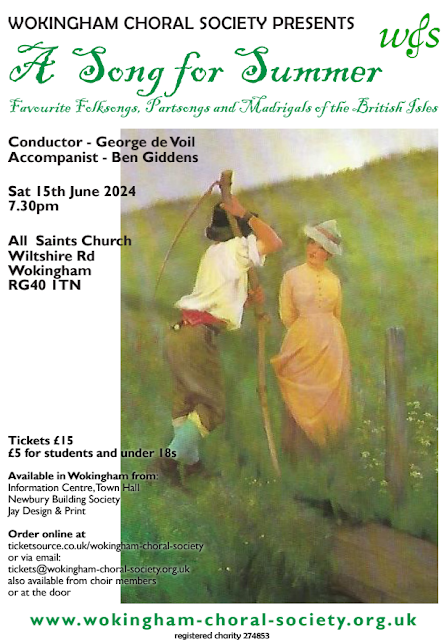I wrote No. 1 more than eight years ago, when the Wokingham Choral Society was giving a concert that included three pieces that I'd sung before. This time there's only one piece I know I've sung before, though as the programme involves madrigals and I have sung several before...
<autobiographical-note>
In 1979 I was working with the rump of the OUP General Division (don't ask) who had not yet migrated from London to Oxford – mostly a small team working on the 3rd edition of the Oxford Dictionary of Quotations and the Early Music department. Both these teams were focused on books to be published to coincide with the quincentenary celebrations.<parenthesis>
'500 years of publishing at Oxford' [not all OUP, but still...]
</parenthesis>The music book was the Oxford Book of English Madrigals, and at the launch party there was a performance of some of the songs in it, given by a group of singers from that London outpost. Many years later I was in the Reading u3a Madrigals group.
</autobiographical-note>
...I expect a lot of the music in this concert to be familiar.
When I was looking out the music for the main piece, John Rutter's The Sprig of Thyme I found between its pages the programme from the last time I sang it, in 1999.
<autobiographical-note type="prescript">
In an earlier blog I wrote of the main piece in that 1999 concert:
A good few years ago, I sang (not with my present choir) Howard Blake's Song of St Francis. The setting was mid-late 20th century, but the text was by St Francis of Assisi, written in whatever Italic dialect he spoke – Umbrian of the 13th century, probably. But saying it was written in that dialect is an oversimplification. Vulgar Latin had various different substrates – whatever medium of spoken communication underlay it – throughout Romania (in the historical sense of 'that part of the world that was directly influenced by the Romans'). St Francis may have thought (if he thought about it at all) he was writing Latin. Strongly influenced as his life was by Latin texts, it is probably a rather Latinate form of his dialect.
Anyway, speculation like that is something I left behind 40-odd years ago...(The rest of that post is quite fun though I says it as shouldn't including a speculation about Respighi and the Doppler Effect, but I'll leave it to interested parties, if there are any, to do the necessary clicking.)
Anyway, the point is that the programme includes a translation of that 13th century text, signed "RJK". I don't remember doing it, but it must have been me.
</autobiographical-note>
Enough, or as they say in Portugal Chega!
<note-to-self>
Must tell Alastair Campbell, whose The Rest is Politics podcast is great fun, how to pronounce the Portuguese party of that name.
</note-to-self>
It promises to be a charming concert. Don't miss it.
b

No comments:
Post a Comment